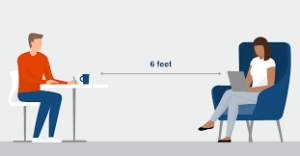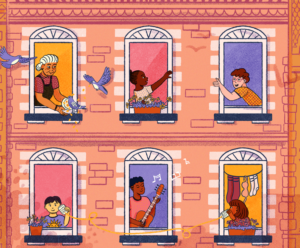
07 Dec Connection in the Time of Covid-19

2020 will forever be known as the year that COVID-19 changed our lives. But will it be remembered for its horrific impact on our lives or will it be remembered as the way that we all banded together to cope and find new ways of going about our lives? In order to answer this question, we must first take a look at why interactions with those around us is so important.
Why do we crave interaction?

Humans are social creatures, and have relied on our connections with other humans as a means to survive and thrive as a species. Even from our earliest days, we have needed the help of others to feed ourselves and our families, procreate, and advance to the point we are at now. Even in the middle of a worldwide pandemic, we still need social interaction to get us through the day. Loneliness and disconnection are a huge threat to our mental and physical well-being. Disconnection from those around us can be devastating to our sense of self and our sense of the world, making it even more difficult to reconnect.
In recent weeks, workplaces have largely moved online and video meetings have become commonplace. FaceTime and Skype are replacing face to face visits with grandparents. Hugs and kisses are given on opposite sides of the windows at nursing homes. Classrooms around the world are now online, with teachers leading discussions and lessons from their own homes. This all reinforces our absolute need for social interactions to survive. From the food we eat to the medicine we take, all of this requires social interaction to come to fruition. With our uncanny ability to adapt, we have found new ways to keep the world moving, and are learning a lot about ourselves in the process.
What social distancing is teaching us
The shift to social distancing is bringing up new challenges many have never had to think about. Where to get essential supplies, how to manage working at home with children and spouses, job loss, disruption to school and day care routines, cancellation of social events, and so many other changes to daily routines have forced us all to think outside the box. We are learning along the way, and some incredible lessons are coming out of the perceived chaos.
Compassion for our fellow man is something that we can very easily push aside. But when we are called to think of more than just ourselves, many will be pleasantly surprised to find that lending a helping hand to someone in need is what many choose to do. There are stories coming from all over the world of great acts of kindness and compassion, especially to those that are most vulnerable to the virus. Retailers offering special hours to protect those who need it most, delivery services extending hours and operations to assist in getting food to families who need it, and the outpouring of support for all of those on the front lines both in and out of the hospitals are just a few of the prime examples of the kindness and compassion that do exist in the world every single day that we often take for granted.
Along with compassion, there are great examples of selflessness over selfishness. Within the first week of the proposed stay-at-home orders, there were several instances of stores being out of stock of essential items for no other reason than a few people stockpiling in a way that was completely unnecessary. Even before stores began to limit the purchase of essential products indefinitely, communities across the country banded together to ensure that everyone got what they needed. Large donations to food banks have poured in, as well as offerings on Facebook groups to share stockpiled goods. We are remembering that in order to take care of ourselves, we must also care for others.
And if nothing else, COVID-19 has taught us about our resilience as a species – our unmatched ability to adapt and overcome in even the most precarious of situations. With the changing rules and recommendations, new ways to go about our lives are being adopted and accepted without much hesitation. We have banded together to stay home and flatten the curve to help prevent further spread and to protect those that are most vulnerable in our communities. We have found new ways to maintain businesses and supply chains, allowing many to maintain income in a time when our social system has become inundated with applications for assistance to many who were laid off and are unable to return to work at this time due to closures. This speaks to the unwillingness of human kind to back down from challenges that seem insurmountable.
Even with all of the kindness, compassion, selflessness, and resilience, many still struggle with the unknowns – when will we be able to reopen businesses? When will the kids be able to go back to school? When will we be able to have social gatherings? When will life go back to “normal”? Finding ways to cope with social distancing is an important step in making sure that we all stay on top of our mental and physical health.
Coping with social distancing

Social distancing is not a choice that anyone got to make for themselves. With this lack of choice, there is a feeling of a loss of control over ourselves and our surroundings. A loss of control can lead to feelings of helplessness, hopelessness, anger, anxiety, and depression. All of these feelings are expected as our lives have been turned upside down in a lot of ways. It is the way that we choose to cope with these feelings that will define our ability to adapt and preserve through times such as this.
There are several ways to stay connected with our friends and families through social distancing. Mailing cards and letters, video calls, phone calls, and social media are just a few of the ways that many are choosing to stay in touch.
There has also been a huge push for constant productivity during isolation, but there is also nothing wrong with giving yourself a break. You don’t have to finish projects, work on yourself, keep the house spotless, or even be in touch with people every day. There is nothing wrong with taking time to sit on the couch, eat comfort food, and be alone with your TV. Cut yourself some slack and don’t succumb to the artificial pressure to be this new and wonderful you.
How to practice empathy
Getting outside is a great way to boost your mood and reconnect with yourself that doesn’t involve the newest self-help seminar or book. Taking a walk around your block, minding the 2 metre gap between you and others can help bring calm and peace in a way that a lot of other things cannot. It is also great exercise, and can help release some of those “feel good” neurotransmitters, dopamine and serotonin.

With all of the changes during social distancing, it can be easy to lose sight of the many positive and meaningful things that are coming out of this situation. Through compassion, kindness, and a lot of hard work, we are showing ourselves and each other that we really are all connected. The COVID-19 pandemic will be remembered for the toll it has taken, but it will also be remembered for all of the ways that we as a society have banded together to adapt and overcome.
